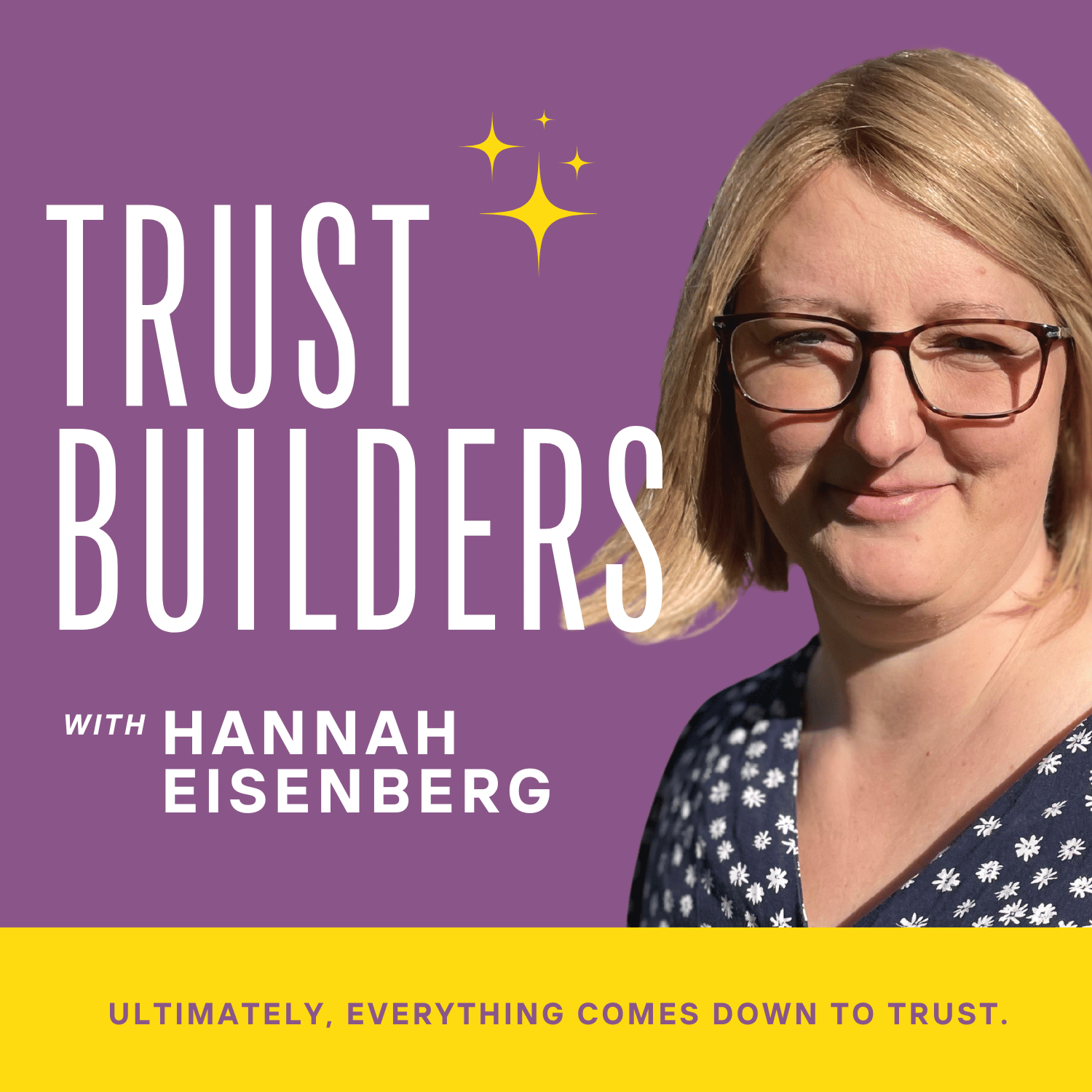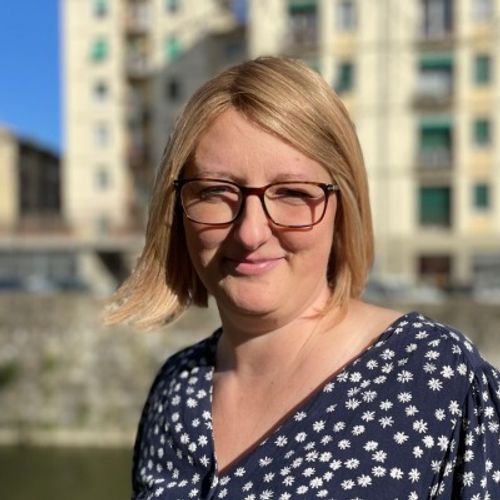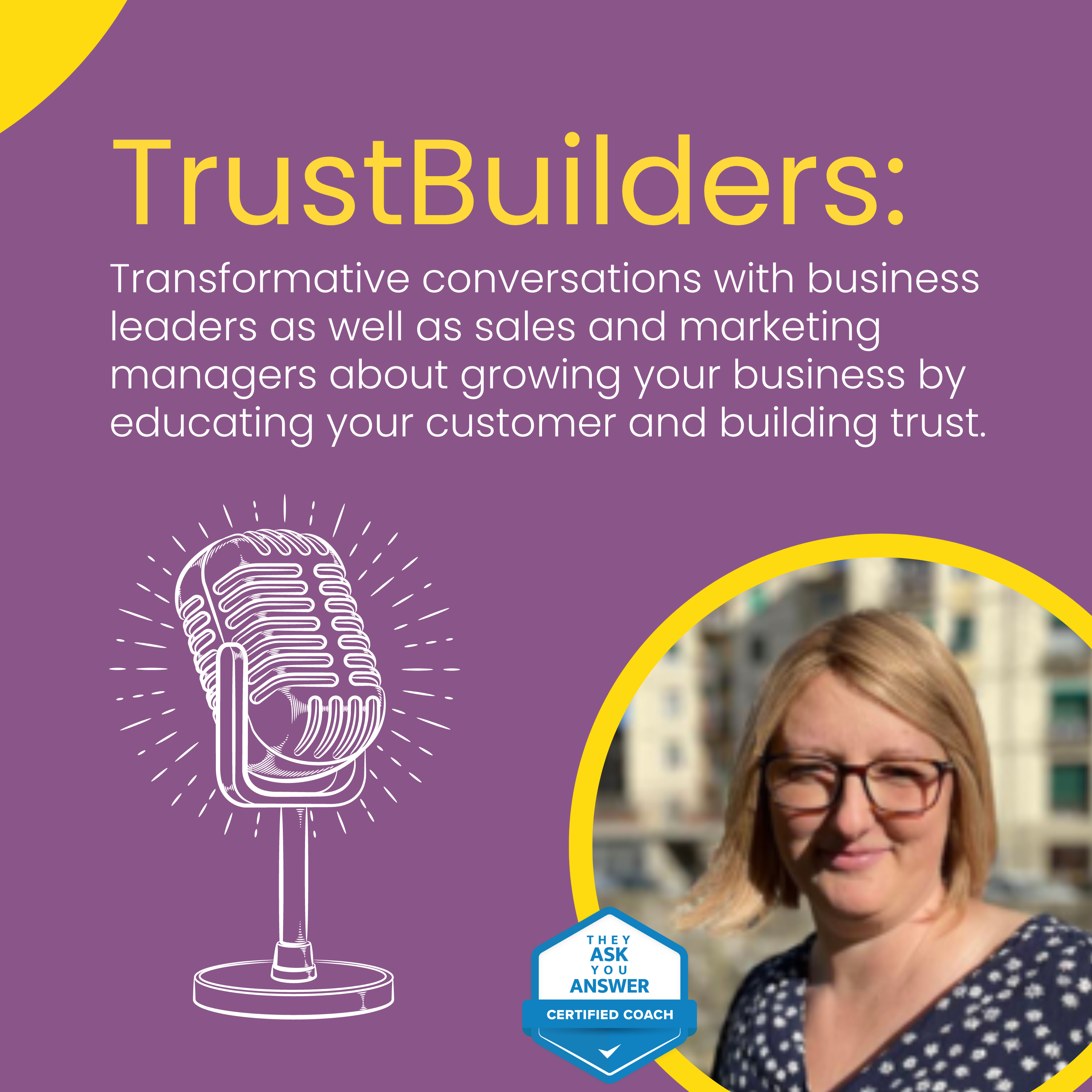Episode 18
We Need To Completely Rethink Our Content Marketing Strategy From The Ground Up
In this solo episode of Trust Builders, Hannah Eisenberg explores the evolution of inbound marketing and the challenges it faces in today's landscape.
Drawing on her 12 years of experience in the field, she discusses how the traditional methods of content marketing are changing and why creating educational content is still crucial. Hannah dives into the concept of the 'zero-click' world, where buyers research extensively before contacting salespeople. She emphasizes the importance of transforming your website into a dynamic, evergreen knowledge base.
Learn about the shifts in content strategy, the role of generative AI and self-service tools, and how businesses can effectively engage and educate buyers in this new era of marketing. Hannah also outlines the essential types of content and tools to maintain a successful inbound marketing strategy in 2023 and beyond.
Timestamps:
00:50 The Evolution of Inbound Marketing
02:59 Challenges in Current Inbound Strategies
05:09 Is Educational Content Still Important?
06:24 The Zero Click World
10:58 Transforming Your Website into a Knowledge Base
13:58 The Future of Website Interaction
18:23 Key Content Strategies
20:24 Conclusion and Final Thoughts
ABOUT THE HOST
Hannah Eisenberg is a business coach who helps companies achieve unparalleled results by disrupting their industry and truly becoming customer-centric. She has coached and trained marketing and sales teams for over a decade. She is a certified “They Ask You Answer” coach, a highly successful sales and marketing framework developed by Marcus Sheridan to help companies become the most trusted voice in their space, driving sales and revenue regardless of the economy.
Hannah is available for coaching, consulting, and strategy engagement. You can connect with Hannah here:
- LinkedIn: https://www.linkedin.com/in/hannaheisenberg/
- Podcast Website: https://trustbuilders.captivate.fm/
- Hannah's Website: https://www.3pcreativegroup.com/
LINKEDIN NEWSLETTER
If you liked the episode and would like to subscribe to our LinkedIn TrustBuilders newsletter, you can do so here.
REVIEW THE PODCAST
Finally, if you enjoyed this episode, please leave a review at PodChaser or your favorite streaming platform.
Transcript
===
[:Now, I want to do today a solo episode because I really would like to share with you something that I've been mulling over for the last three to six months. And if you have been following me or if you know me, I'm always really interested in content marketing strategy and how to use educational content.
ency way back when I think in:I fell in love with the idea of inbound marketing way back when, because as Daniel Pink says it so nicely in to sell as human, there was this imbalance of information, right? So the sales person used to have all the information. Me, as a buyer, I would have to go to that said sales person and have to inquire and they would share with me.
However, that put me at a disadvantage because the salesperson could rip me off, because I didn't have all the information. So the, here's where inbound marketing comes in.
percent of the buyer's [:So they are equipped with a lot of info, with data, with pricing, whatever they can And now the salesperson comes in and just does a consultative role of, Yep, you understood that, right? Yep, I can confirm that pricing for you. But it isn't that gatekeeping of information anymore. Now, the beauty of inbound marketing was that you, as a marketer, you just went and you did some keyword research.
Then you found the keywords that you wanted to go after. You wrote a little bit about keywords. A nice blog post, depending on how many people in your industry did in that marketing as well. In the beginning, it was just very easy just to rank for anything. And now it became harder and harder as more people did it now.
But [:Or has decreased. Now some of that might be attributed to the Different way of google displaying results, right? There's the generative ai results. There's knowledge graphs people Also ask there's ads. Let's not forget about the annoying ads So the organic search results go down further and further, but that's not The full story is really that people You Shifting how they're doing their research and how they're interacting with brands before they reach out to the salesperson. So now remember it's 70 to 85 percent of that research journey is done by themselves. And now this whole inbound journey of getting them there. isn't working. So what are they doing? Where are they going to get that information?
w can you reach out to them? [: e seen them ask, or you come [:But purely writing content for the sake of ranking in SEO, don't bother. It's just noise. Stop doing it. Like seriously. Stop doing it. All right, getting off my soapbox. All right, so let's address this new world. Okay. As I said before, there was this beautiful linear journey that we had from putting out a piece of content to having them submit their information to download an ebook.
And now we That is pretty much gone. We need to rethink And divide up our new content marketing world in two different worlds.
orld of where our buyers are [:Okay. So think about what you're doing. You're scrolling on Instagram and you're seeing a reel that sparks your interest. Or you are watching a YouTube short and you discover something. Or you read a newsletter or you hear a podcast about a certain topic. So it, although it sounds like a lot of it is B2C, this is very much applicable for B2B as well, right?
we have this bubble that is [:But a lot of times they don't click through or they click To a Google search window and search that term they just got across. But there is a lot of, either zero click going on or I will search that and research it differently or switching devices. There's so many, it's a mess in that bubble.
y get them to engage with us [:Could we create a podcast that we put in that zero click format? bubble and they subscribe to it, or a newsletter, could we work with partners together to accomplish that as well? We have to think very creatively here in this bubble, because as you can imagine with ad blockers, cookie guidelines, data, privacy guidelines, device switching, there's so many reasons why in this, and zero click, obviously, why we can't properly attribute what is happening now? Now I want to, make you aware of a phenomenal
five minute whiteboard that van Fishkin did where he went into that much, much more in detail. And that is a phenomenal way of describing why this is happening. So I'll put the link in the show notes.
So definitely [:Now, if we have this zero click bubble where people are, researching, maybe they're subscribing, but we don't really know what's happening because we can't attribute to anything. We can measure some, but it's difficult, right? So we're really trying to engage with our audience there.
And next week I'm going to do a, another episode by myself where I'm actually going to go into what content works in each of these segments the best. Okay. But let's just say this bubble. And ultimately the goal is for them to subscribe to a newsletter podcast, something that you build an audience with, or they go to the website, but because it's called zero click.
That's not the ultimate thing that you're going to have happen. All right, now let's switch from this side to this side. That's your website.
Okay, [:And that is phenomenal, but that isn't going to happen anymore. So now we need to switch how we approach the website. Because just pushing our chronological blog posts isn't going to help us much.
really our in depth content [:And this website is now becoming the knowledge base around that topic. Now, more than ever, it is important to become the most trusted voice in your space, the best educator out there.
All right. So is educational content still important? Absolutely. Absolutely. But it lives in that website bubble. and spreads its findings and its insights and its learnings into that zero click bubble. But the actual educational content that is constantly maintained, kept up to date, fresh, and improved upon constantly sits on our website.
cally just add something to, [:all right, so let's talk real quick about the, how that looks on your website. Okay. So let's move from the zero click bubble. Cool. into the website bubble. Now, the website bubble, as I already hinted, is becoming this evergreen knowledge base. Now, instead of just pushing publish on a blog post and just adding on top, on a chronological row of content, we are now going to maintain that knowledge base, always up to date, always fresh.
ite and our blog. So now, if [:And you type in a question, for example, if you go to my website, how much does it cost to work with Hana, or what's the benefit of working with a business coach, or can you explain the ask your answer to me? Whatever it is that you come to my website to learn about. You will, instead of going to the search button, instead of going to read a blog post, you will just type in that question in the search box and generative AI will read that website and then get you an auto generated answer based on that content.
rrent and has to be correct, [:So you can already, with the software that I'm using right now to record this video, You could already create a digital, or I could, a digital avatar of myself. And training it and giving it script to read. So now in a little while you could have little Hannah sitting at the bottom of the website. It's a bit creepy, but you could have a digital avatar of yourself sitting on your website and telling that person the answer with your own voice, with your face.
So all of that bottom stuff [:Okay. So underneath that layer, then you will have a learning center. So instead of pointing people to the blog and here, good luck. Here's some blog categories you can browse through. We will have a learning center that you can go to And you can say, this is my role, I'm looking for this type of content, or I have a question around this, what do you have?
salesperson to find out what [:They will have to have FAQs. They will have to have brochureware. So your one pager, your explainer video, there, there has to be really in depth information on there that a buyer can come. And learn from your website about your product. Okay, imagine there's no salespeople. Of course, salespeople are important.
week's episode, is a lot of [: super focused on your unique [:It's not just your plain how to article anymore. And what is? So if there is a big question that is unanswered in your industry of what is this thing? Maybe it's a new market category or whatever it is. That's what you answer there. But again, deep expertise and experience, no fluff content anymore. So that's the written content part.
And then there is the video content part. And that's where we really go into the selling seven. So there we have the 80 percent video. We have the employer, employee bio video, the product and service video, the landing page video, price and cost video The customer journey video and claims we make video.
rms of the website, you have [: to build subscriptions, but [:It's just to build your audience, to build your relationships, to really partake in that bubble and then you move into the website bubble and that's where all your educational content lives that you maintain and that you organize neatly. Put generative AI on and really that's where your conversions will help.
Okay, but we have to rethink this whole, Oh, let's do inbound marketing for lead gen does not work anymore. I would love to hear what you think about it. I would love to hear your comments and am I off track? Is this something that you see maybe happening as well? Did you find anything particularly useful?
I would really love to continue this conversation until next time. Bye bye.


